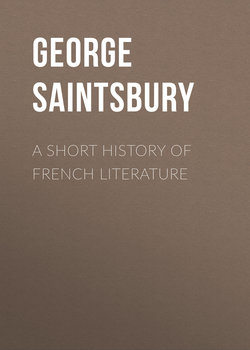Читать книгу A Short History of French Literature - Saintsbury George - Страница 14
BOOK I
MEDIAEVAL LITERATURE
INTERCHAPTER I
SUMMARY OF MEDIAEVAL LITERATURE
ОглавлениеIn the foregoing book a view has been given of the principal developments of mediaeval literature in France. The survey has extended, taking the extremest chronological limits, over some eight centuries. But, until the end of the eleventh, the monuments of ancient French literature are few and scattered, and the actual manuscripts which we possess date in hardly any case further back than the twelfth. In reality the history of mediaeval literature in France is the history of the productions of the twelfth, thirteenth, fourteenth and early fifteenth centuries with a long but straggling introduction, ranging from the eighth or even the seventh. Its palmy time is unquestionably in the twelfth and the thirteenth. During these two hundred years almost every kind of literature is attempted. Vast numbers of epic poems are written; one great story, that of Arthur, exercises the imagination as hardly any other story has exercised it either in ancient or in modern times; the drama is begun in all its varieties of tragedy, comedy, and opera; lyric poetry finds abundant and exquisite expression; history begins to be written, not indeed from the philosophic point of view, but with vivid and picturesque presentment of fact; elaborate codes are drawn; vernacular homilies, not mere rude colloquial discourses, are composed; the learning of the age, such as it is, finds popular treatment; and in particular a satiric literature, more abundant and more racy if less polished than any that classical antiquity has left us, is committed to writing. It is often wondered at and bewailed that this vigorous growth was succeeded by a period of comparative stagnation in which little advance was made, and in which not a little decided falling off is noticeable. Except the formal lyric poetry of the fourteenth and early fifteenth centuries, and the multiplied dramatic energy of the latter, nothing novel or vigorous appears for some hundred and forty years, until the extreme verge of the period, when the substitution of the prose tale, as exemplified in the work attributed to Antoine de la Salle, for the verse Fabliau, opens a prospect which four centuries of progress have not closed. The early perfection of Italian, a language later to start than French, has been regretfully compared with this, and the blame has been thrown on the imperfection of mediaeval arrangements for educating the people. The complaint is mistaken, and almost foolish. It is not necessary to look much further than Italian itself to see the Nemesis of a too early development. French, like English, which had a yet tardier literary growth, has pursued its course unhasting, unresting, to the present hour. Italian since the close of the sixteenth century has contributed not a single masterpiece to European literature, and not much that can be called good second-rate. It is not impossible that the political troubles of France – the Hundred Years' War especially – checked the intellectual development of the country, but if so, the check was in the long run altogether salutary. The middle ages were allowed to work themselves out – to produce their own natural fruit before the full influx of classical literature. What is more, a breathing time was allowed after the exhaustion of the first set of influences, before the second was felt. Hence the French renaissance was a far more vigorous growth than the renaissance of Italy, which displays at once the signs of precocity and of premature decay. But we are more immediately concerned at the present moment with the literary results of the middle ages themselves. It is only of late years that it has been possible fully to estimate these, and it is now established beyond the possibility of doubt that to France almost every great literary style as distinguished from great individual works is at this period due. The testimony of Brunetto Latini as to French being the common literary tongue of Europe in the thirteenth century has been quoted, and those who have read the foregoing chapters attentively will be able to recall innumerable instances of the literary supremacy of France. It must of course be remembered that she enjoyed for a long time the advantage of enlisting in her service the best wits of Southern England, of the wide district dominated by the Provençal dialects, and of no small part of Germany and of Northern Italy. But these countries took far more than they gave: the Chansons de Gestes were absorbed by Italy, the Arthurian Romances by Germany; the Fabliaux crossed the Alps to assume a prose dress in the Southern tongue; the mysteries and miracles made their way to every corner of Europe to be copied and developed. To the origination of the most successful of all artificial forms of poetry – the sonnet – France has indeed no claim, but this is almost a solitary instance. The three universally popular books (to use the word loosely) of profane literature in the middle ages, the epic of Arthur, the satire of Reynard the Fox, the allegorical romance of the Rose, are of French origin. In importance as in bulk no literature of these four centuries could dare to vie with French.
